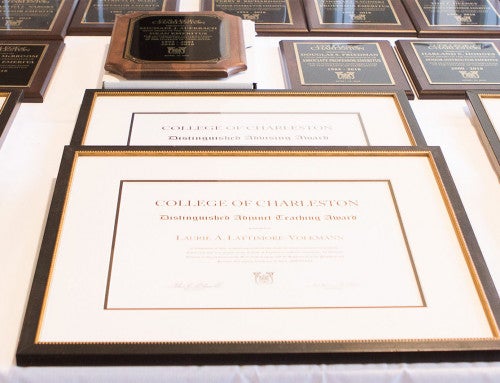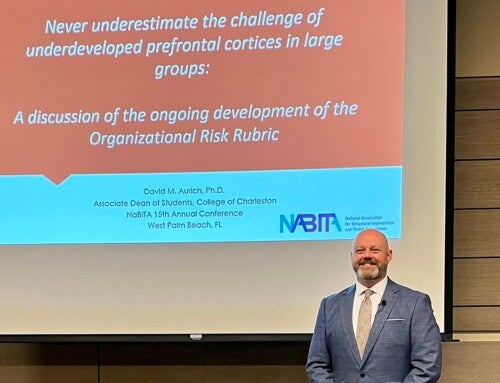Searching for research funding can be overwhelming – but the Office of Research and Grants Administration (ORGA) is here to take the stress out of the process so that College of Charleston faculty are able to concentrate on their research at hand. As the central source of information on major government agencies, foundations and corporations that impact research and scholarship, ORGA compiles lists of funding opportunities and deadlines in its monthly newsletter, #GETFUNDEDCOFC.
Below is a sneak peek of some of the upcoming funding opportunities that CofC faculty won’t want to miss!
 Spencer Foundation – Large Research Grants on Education
Spencer Foundation – Large Research Grants on Education
Intent to Apply Deadline: May 4, 2022
Application Deadline: June 15, 2022
Get more information
The Spencer Foundation is the leading funder of education research since 1971, and is the only national foundation focused on exclusively supporting education research. The Large Research Grants on Education Program supports education research projects that contribute to the improvement of education. The program is field-initiated, meaning that proposal submissions are not in response to a specific request for a particular research topic, discipline, design, method or location. The program’s goal is to support rigorous, intellectually ambitious and technically sound research that is relevant to the most pressing questions and compelling opportunities in education. Grants will be made with budgets between $125,000 and $500,000 for projects ranging from one to five years.
 National Endowment for the Humanities – Infrastructure and Capacity Building Challenge Grants
National Endowment for the Humanities – Infrastructure and Capacity Building Challenge Grants
Application Deadline: May 17, 2022
Get more information
The National Endowment for the Humanities (NEH) Infrastructure and Capacity Building Challenge Grants support two distinct types of projects (i.e., Capital Projects and Digital Infrastructure) that aim to strengthen the institutional base of the humanities by enabling infrastructure development and capacity buildings, and expanding efforts to preserve and create access to outstanding humanities materials. Capital Projects support the purchase, design, construction, restoration or renovation of facilities for humanities activities. Digital Infrastructure supports the maintenance, modernization and sustainability of existing digital scholarly projects and platforms. The maximum award amount is $1,000,000. The start date for accepted projects is between March 1 and June 1, 2023.
 U.S. Department of Education – Undergraduate International Studies and Foreign Language Program Application Deadline: May 31, 2022
U.S. Department of Education – Undergraduate International Studies and Foreign Language Program Application Deadline: May 31, 2022
Get more information
The U.S. Department of Education (USDEd) Undergraduate International Studies and Foreign Language (UISFL) Program provides grants for planning, developing and carrying out projects to strengthen and improve undergraduate instruction in international studies and foreign languages in the United States. Projects may support (1) the development of global or international studies programs that are interdisciplinary in design, (2) the improvement of programs or classes in foreign languages and international affairs and (3) the creation of curricula, teaching and instructional materials, professional studies or internships for students. The award ceiling for each grant is $120,000, with a project period of up to 24 months.
 BlueCross BlueShield of South Carolina Foundation – Health Priority Grants
BlueCross BlueShield of South Carolina Foundation – Health Priority Grants
Letter of Intent for Fall Cycle: Opens May 2022, Closes August 2022
Get more information
The BlueCross BlueShield of South Carolina Foundation supports projects that improve health outcomes and increase access to care in South Carolina. The Health Priority Grants fund programs and initiatives aligned with the BlueCross BlueShield Core 4 Health Priorities: oral health, mental health, diabetes and social determinants of health. All proposed projects and programs must also aim to improve access to care, build a stronger workforce for health, improve the quality and value of health and health care and/or invest in the health and wellbeing of South Carolina children and families. Potential applicants should contact the foundation to discuss proposed project ideas before submitting a letter of intent. Applicants with accepted letters of intent will be invited to submit a full proposal application.
 U.S. Department of Defense – Air Force Office of Scientific Research Air Force FY 2023 Young Investigator Program
U.S. Department of Defense – Air Force Office of Scientific Research Air Force FY 2023 Young Investigator Program
Application Deadline: June 6, 2022
Get more information
The U.S. Department of Defense (DoD) Air Force Office of Scientific Research (AFOSR) FY 2023 Young Investigator Program (YIP) will support early career scientists and engineers who have received a Ph.D. or equivalent degree showing exceptional ability and promise to conduct basic research. The program aims to foster creative basic research in science and engineering, enhance early career development of outstanding young investigators and increase opportunities for the young investigator to recognize the Air Force and Space Force mission and related challenges in science and engineering. Awards fund up to $150,000 per year for a project period of three years.
 National Institutes of Health – Academic Research Enhancement Award for Undergraduate-Focused Institutions (R15 Clinical Trial Not Allowed)
National Institutes of Health – Academic Research Enhancement Award for Undergraduate-Focused Institutions (R15 Clinical Trial Not Allowed)
Application Deadlines: June 25, and Oct. 25, 2022
Get more information
The National Institutes of Health (NIH) aims to stimulate research at educational institutions that provide baccalaureate and/or advanced degrees for a significant number of the nation’s research scientists. The purpose of the Academic Research Enhancement Award (AREA) for Undergraduate-Focused Institutions is to support small-scale research grants at institutions that do not receive substantial funding from the NIH, with an emphasis on providing biomedical research experiences primarily for undergraduate students and enhancing the research environment at applicant institutions. AREA funds support new and renewal biomedical research projects proposed by faculty members of eligible institutions. Awards will be made up to $300,000 for a project period of up to three years. For applications submitted for the June 25 deadline, the earliest start date for projects is April 2023. For applications submitted for the Oct. 25 deadline, the earliest start date for projects is July 2023.
 National Endowment for the Arts – Grants for Arts Projects
National Endowment for the Arts – Grants for Arts Projects
Application Deadline: July 7, 2022
Get more information
Through project-based funding, the National Endowment for the Arts (NEA) Grants for Arts Projects program will support public engagement with and access to various forms of art across the nation, the creation of art, learning in the arts at all stages of life, and the integration of the arts into the fabric of community life. The program funds arts projects in the following disciplines: artist communities, arts education, dance, design, folk and traditional arts, literary arts, local arts agencies, media arts, museums, music, musical theater, opera, presenting and multidisciplinary arts, theater and visual arts. A project may consist of one or more specific events/ activities or may be a new initiative or part of an organization’s regular daily/seasonal activities. Awarded grants range between $10,000 and $100,000. The earliest start date for proposed projects is June 1, 2023.
 National Science Foundation – Social Psychology Program
National Science Foundation – Social Psychology Program
Application Deadline: July 15, 2022
Get more information
The National Science Foundation (NSF) Social Psychology Program supports research and infrastructure to advance knowledge of human social behavior, including neural and physiological patterns, thought and emotion processes and intentions, and actions and habits that explain ways of thinking about and relating to others. The goal of this program is to increase basic knowledge to support national health, prosperity and welfare of the public. Proposed research projects should carry strong potential for creating transformative advances in the basic understanding of human social behavior and be interdisciplinary, multidisciplinary and convergent in practice.
 National Science Foundation – Faculty Early Career Development Program
National Science Foundation – Faculty Early Career Development Program
Application Deadline: July 27, 2022
Get more information
The National Science Foundation (NSF) Faculty Early Career Development (CAREER) Program is a foundation-wide activity that offers the National Science Foundation’s most prestigious awards in support of early-career faculty who have the potential to serve as academic role models in research and education and to lead advances in the mission of their department or organization. Activities pursued by early-career faculty should build a firm foundation for a lifetime of leadership in integrating education and research. All CAREER proposals should describe an integrated path that will lead to a successful career as an outstanding researcher and educator. A CAREER award will fund faculty at a minimum of $400,000 over a five-year project duration.
 National Science Foundation – Division of Chemistry: Disciplinary Research Programs
National Science Foundation – Division of Chemistry: Disciplinary Research Programs
Application Deadline: Sept. 30, 2022
Get more information
The National Science Foundation (NSF) Division of Chemistry: Disciplinary Research Programs (CHE-DRPs) support a large and vibrant research community engaged in fundamental discoveries, invention and innovation in the chemical sciences. CHE supports projects that explore the frontiers of chemical science, develop the foundations for future technologies and industries that meet changing societal needs, and prepare the next generation of chemical researchers. Proposal applications may be submitted to the following nine CHE-DRPs: Chemical Catalysis (CAT), Chemical Measurement and Imaging (CMI), Chemical Structure, Dynamics and Mechanisms-A (CSDM-A), Chemical Structure Dynamics and Mechanisms-B (CSDM-B), Chemical Synthesis (SYN), Chemical Theory, Models and Computational Methods (CTMC), Chemistry of Life Processes (CLP), Environmental Chemical Sciences (ECS), and Macromolecular, Supramolecular and Nanochemistry (MSN). The average award size is $150,000 for projects taking place over a three-year duration.
 National Science Foundation – Hydrologic Sciences
National Science Foundation – Hydrologic Sciences
Proposals Accepted Anytime
Get more information
The National Science Foundation (NSF) Hydrologic Sciences Program focuses on linking the fluxes of water and the components carried by water across boundaries between interacting components of the terrestrial system, as well as the mechanisms by which these fluxes co-organize over a variety of temporal and spatial scales. The program supports the study of hydrologic processes (e.g., rainfall and runoff, infiltration and subsurface flow, evaporation and transpiration), as well as fluxes of water (e.g., in soils, aquifers, streams). Many projects involve the study of hydrologic transport (e.g., of dissolved solutes, sediment), coupling of hydrological processes with other systems (e.g., ecosystem processes, geochemical cycles, food and energy systems, socioecological systems) or hydrologic responses to change (e.g., changes in land use, climate, watershed management). The program is interested in how hydrological processes couple to and interact with the geosphere, the critical zone, the landscape and ecosystems, as well as how the water cycle and its coupled processes are altered by land use and climate. Observational, experimental, theoretical and modeling approaches are supported. The average award size and project duration are subject to the availability of funds, the quality of submissions and the anticipated benefits to biological research.
Faculty planning to submit a proposal for external funding, should contact ORGA at [email protected].
For further assistance with funding opportunities, email [email protected], and follow ORGA on Facebook and Twitter for updates on funding opportunities, helpful tips and previous awards.




